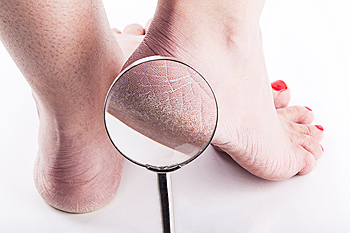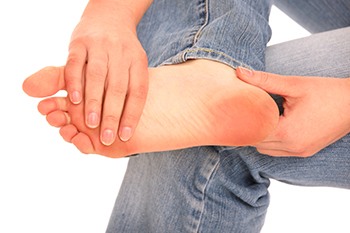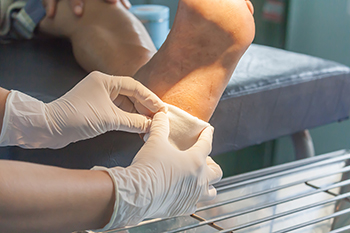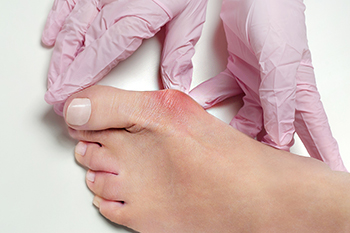Items filtered by date: June 2023
A Lack of Vitamins May Cause Cracked Heels

Many people have the foot condition that is known as cracked heels. Various reasons, including vitamin deficiency, can cause this ailment. A lack of vitamin E can affect the skin and cause it to dry. Good sources of this vital nutrient can include sunflower seeds, salmon, avocado, and various oils. Additionally, patients who do not have adequate amounts of vitamin B-3 may develop a condition called pellagra. This can cause the skin to become dry and scaly, affecting the heels. Sources of this vitamin can consist of brown rice, lentils, poultry, and seafood. Existing medical conditions may also lead to developing cracked heels, such as eczema and athlete’s foot. Cracked heels can be prominent among people who frequently walk barefoot and may be prevented when sandals or shoes are worn. If you have cracked heels, it is suggested that you schedule an appointment with a podiatrist who can guide you toward the treatment routine that is correct for you.
If the skin on your feet starts to crack, you may want to see a podiatrist to find treatment. If you have any concerns, contact the foot specialists from Table Mountain Foot and Ankle. Our doctors can provide the care you need to keep you pain-free and on your feet.
Cracked Heels
It is important to moisturize your cracked heels in order to prevent pain, bleeding, and infection. The reason cracked heels form is because the skin on the foot is too dry to support the immense pressure placed on them. When the foot expands, the dry skin on the foot begins to split.
Ways to Help Heal Them
- Invest in a good foot cream
- Try Using Petroleum Jelly
- Ease up on Soaps
- Drink Plenty of Water
Ways to Prevent Cracked Heels
- Moisturize After Showering
- Skip a Shower
- Keep Shower Water Lukewarm
- Don’t Scrub Your Feet
If you are unsure how to proceed in treating cracked heels, seek guidance from a podiatrist. Your doctor will help you with any questions or information you may need.
If you have any questions, please feel free to contact our office located in Wheat Ridge, CO . We offer the newest diagnostic and treatment technologies for all your foot care needs.
Are You Suffering From Nerve Damage?
Foot Pain and Fibromyalgia

Patients who have fibromyalgia can have pain anywhere in their bodies, including the feet. This type of pain can greatly impact the quality of life because walking is such an essential function. Those who have fibromyalgia and foot pain have described it as a burning sensation on the bottom of the feet. It can also be uncomfortable as the shoes touch the soles or tops of the feet. The reason some people with this ailment have foot pain is unknown, but some studies have shown the nerves of the feet may get triggered. Additionally, the inflammation that comes with fibromyalgia can affect the fascia, which is a band of tissue that runs from the heel to the toes. The plantar fascia is on the bottom of the foot and helps to support the arch and the joint just below the ankle. There may also be coexisting conditions such as rheumatoid arthritis or lupus that can exasperate the foot pain felt with fibromyalgia. Left untreated, foot pain and a change in gait can lead to problems in the rest of the body. If you have fibromyalgia and are experiencing foot pain, it is suggested that you see a podiatrist who can provide the best treatment for you.
Foot Pain
Foot pain can be extremely painful and debilitating. If you have a foot pain, consult with the foot specialists from Table Mountain Foot and Ankle. Our doctors will assess your condition and provide you with quality foot and ankle treatment.
Causes
Foot pain is a very broad condition that could be caused by one or more ailments. The most common include:
- Bunions
- Hammertoes
- Plantar Fasciitis
- Bone Spurs
- Corns
- Tarsal Tunnel Syndrome
- Ingrown Toenails
- Arthritis (such as Gout, Rheumatoid, and Osteoarthritis)
- Flat Feet
- Injury (from stress fractures, broken toe, foot, ankle, Achilles tendon ruptures, and sprains)
- And more
Diagnosis
To figure out the cause of foot pain, podiatrists utilize several different methods. This can range from simple visual inspections and sensation tests to X-rays and MRI scans. Prior medical history, family medical history, and any recent physical traumatic events will all be taken into consideration for a proper diagnosis.
Treatment
Treatment depends upon the cause of the foot pain. Whether it is resting, staying off the foot, or having surgery; podiatrists have a number of treatment options available for foot pain.
If you have any questions, please feel free to contact our office located in Wheat Ridge, CO . We offer the newest diagnostic and treatment technologies for all your foot care needs.
Minor Wound Care Methods

A wound is defined as damage to the skin’s surface. Wounds occur when there is a break in the skin due to a cut or scrape. A wound can also be caused by an animal bite and bedridden patients may develop bed sores. For mild wounds, proper wound care can begin with washing the hands, followed by holding a clean cloth on the affected area to help stop the bleeding. It is beneficial to rinse the wound with water and remove any dirt that has lodged inside of it. When the wound is dried, a bandage or gauze can be used to cover it. It is beneficial to change the dressing daily which may help to keep it free of bacteria that may accumulate from daily activities. If you have a wound on your foot, it is strongly suggested that you speak with a podiatrist who can treat and monitor the severity of the wound.
Wound care is an important part in dealing with diabetes. If you have diabetes and a foot wound or would like more information about wound care for diabetics, consult with the foot specialists from Table Mountain Foot and Ankle. Our doctors will assess your condition and provide you with quality foot and ankle treatment.
What Is Wound Care?
Wound care is the practice of taking proper care of a wound. This can range from the smallest to the largest of wounds. While everyone can benefit from proper wound care, it is much more important for diabetics. Diabetics often suffer from poor blood circulation which causes wounds to heal much slower than they would in a non-diabetic.
What Is the Importance of Wound Care?
While it may not seem apparent with small ulcers on the foot, for diabetics, any size ulcer can become infected. Diabetics often also suffer from neuropathy, or nerve loss. This means they might not even feel when they have an ulcer on their foot. If the wound becomes severely infected, amputation may be necessary. Therefore, it is of the upmost importance to properly care for any and all foot wounds.
How to Care for Wounds
The best way to care for foot wounds is to prevent them. For diabetics, this means daily inspections of the feet for any signs of abnormalities or ulcers. It is also recommended to see a podiatrist several times a year for a foot inspection. If you do have an ulcer, run the wound under water to clear dirt from the wound; then apply antibiotic ointment to the wound and cover with a bandage. Bandages should be changed daily and keeping pressure off the wound is smart. It is advised to see a podiatrist, who can keep an eye on it.
If you have any questions, please feel free to contact our office located in Wheat Ridge, CO . We offer the newest diagnostic and treatment technologies for all your foot care needs.
Genetics and Wearing High Heels May Cause Bunions

People who have bunions report it can be one of the most painful foot conditions to have. It is defined as a bony protrusion that forms on the side of the big toe, and will gradually become larger if treatment is not received. A bunion can be caused by genetic reasons, or from wearing shoes that have a tapered toe area. High heels can fit into this category, and it is beneficial to choose shoes that have a lower heel if these types of shoes need to be worn. Corns and calluses may form on top of the toes, as they touch the top of the shoe. This can be uncomfortable, and mild relief may be felt when the shoes that are worn can accommodate the bunion. If the bunion becomes severe and causes the inability to complete daily activities, surgery may be an option to consider for removal and permanent relief. If you see a bunion that is starting to form, it is suggested that you contact a podiatrist who offers you treatment options that are right for you.
If you are suffering from bunion pain, contact the foot specialists of Table Mountain Foot and Ankle. Our doctors can provide the care you need to keep you pain-free and on your feet.
What Is a Bunion?
Bunions are painful bony bumps that usually develop on the inside of the foot at the joint of the big toe. As the deformity increases over time, it may become painful to walk and wear shoes. Women are more likely to exacerbate existing bunions since they often wear tight, narrow shoes that shift their toes together. Bunion pain can be relieved by wearing wider shoes with enough room for the toes.
Causes
- Genetics – some people inherit feet that are more prone to bunion development
- Inflammatory Conditions - rheumatoid arthritis and polio may cause bunion development
Symptoms
- Redness and inflammation
- Pain and tenderness
- Callus or corns on the bump
- Restricted motion in the big toe
In order to diagnose your bunion, your podiatrist may ask about your medical history, symptoms, and general health. Your doctor might also order an x-ray to take a closer look at your feet. Nonsurgical treatment options include orthotics, padding, icing, changes in footwear, and medication. If nonsurgical treatments don’t alleviate your bunion pain, surgery may be necessary.
If you have any questions, please feel free to contact our office located in Wheat Ridge, CO . We offer the newest diagnostic and treatment technologies for all your foot care needs.

